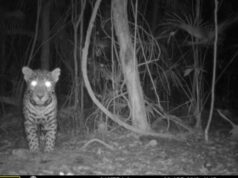 DENTON, TEXAS—Graduate students seeking to advance their careers in different offshoots of sustainable tourism are gaining unique experience through a joint program of the University of North Texas (UNT) and Costa Rica’s Higher Education and Research Center (CATIE), in Turrialba, Costa Rica. The program allows graduate students to earn a joint degree from UNT and CATIE. Students spend the first year at UNT in Denton, Texas, and the second at CATIE. The program launched last fall with six students. Those students, now in Costa Rica, are expected to receive their degrees in May 2012. The next group of students, about 10 to 12 in number, will soon begin the program at UNT. Students graduating from the program will earn a Master of Science degree in International Sustainable Tourism (MIST).
DENTON, TEXAS—Graduate students seeking to advance their careers in different offshoots of sustainable tourism are gaining unique experience through a joint program of the University of North Texas (UNT) and Costa Rica’s Higher Education and Research Center (CATIE), in Turrialba, Costa Rica. The program allows graduate students to earn a joint degree from UNT and CATIE. Students spend the first year at UNT in Denton, Texas, and the second at CATIE. The program launched last fall with six students. Those students, now in Costa Rica, are expected to receive their degrees in May 2012. The next group of students, about 10 to 12 in number, will soon begin the program at UNT. Students graduating from the program will earn a Master of Science degree in International Sustainable Tourism (MIST).
According to Daniel Spears, Ph.D., assistant professor of Hospitality Management at UNT, and who teaches most of the MIST courses, the first year of the joint program has gone “extremely well.” “It’s the only program like it in the world,” Spears said. “The idea for the program started at the president’s level at UNT. Our university is always looking for ways to grow our strategic partnerships internationally.”
The courses, which Spears says provide a “very balanced view of sustainability and sustainable tourism development,” include: International Sustainable Tourism; Tourism Services Management and Marketing; Hotel and Restaurant Operations; Planning and Policy in Sustainable Tourism; Environmental Impact Assessment; Environmental Ethics; Sustainable Natural Resource Management; Context and Challenges of Applied Sustainable Tourism Development; Quantitative and Qualitative Analyses in Sustainable Tourism; and Environmental Policies in a Changing World. There are also seminars in Sustainable Tourism: Experiences of Successful Practitioners in Costa Rica, and students are required to do field work with a linked research project. A presentation is required for the final capstone course at CATIE.
Focus on Triple Bottom Line
In coursework, Spears says students examine policy development and the issues operators are having in implementing specific standards. “They are learning a lot about certification and the challenges operators have—on-property recycling for example—and other operationally significant activities they can potentially do. We are constantly revisiting the triple bottom line (economic, social/cultural, environmental) as it relates to sustainability and sustainable tourism development. We make sure students understand that a balanced approach be taken towards sustainability and tourism development.”
The six students currently in the program include two recent graduates of UNT and others pursuing their second or third careers. “One comes from a recycling background and another out of the cruise industry,” Spears says. “Another has a psychology background.”
Spears says the sustainable tourism program could grow to include other countries besides Costa Rica (CATIE has 13 member countries and other affiliated countries). This would be in line with the university’s goals of sustainability and international growth.
Glenn Hasek can be reached at editor@greenlodgingnews.com.







